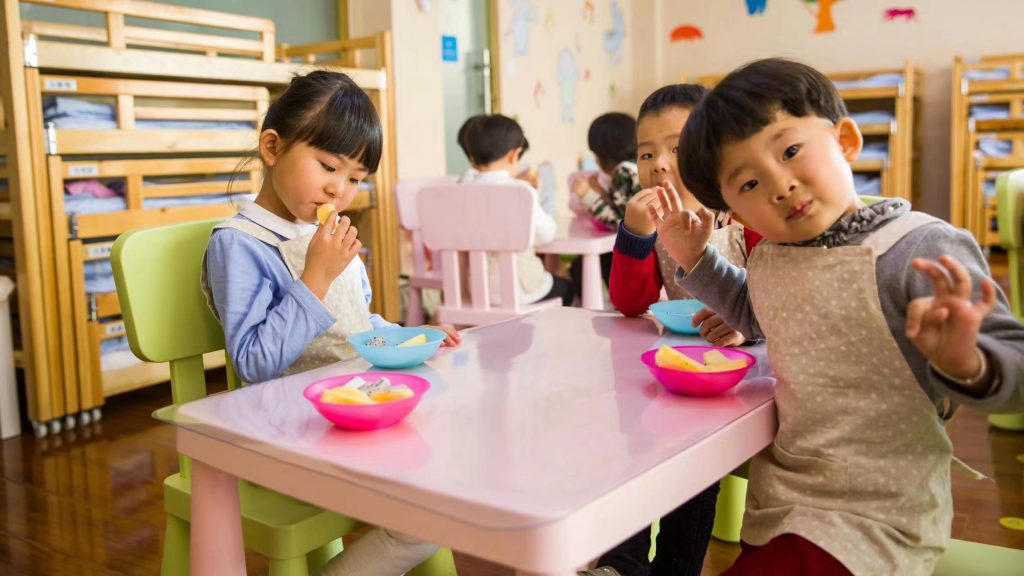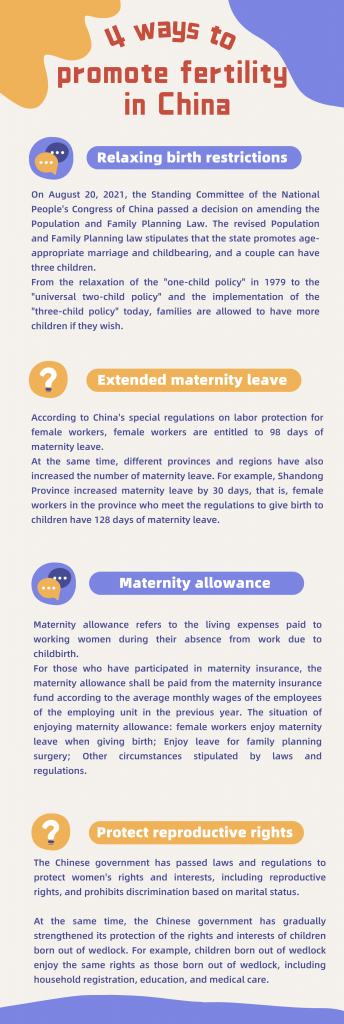The Chinese government is trying to increase the birth rate. But it seems that young people are not willing to have more children, why is that?

Su Mengjia and her boyfriend are often urged to get married and have children by their parents, and they themselves also have discussed this issue many times. It was something that they could see the pleasure in…but neither of them could imagine finding time for kids in their busy lives.
They are both 30 years old and have been together for eight years now, but little has changed. Both of them work full time in the city of Hangzhou. Mengjia works in the advertising and her boyfriend Zhang Jie works long hours in programming.
“My boyfriend and I are enjoying our lives and don’t want to change,” says Mengjia. “Marriage and procreation is a very important life choice, and I don’t feel I’m ready for it, especially financially.”
“We spend our monthly salary on rent and daily shopping, so we don’t really save much money. But having a child can be very expensive,” says Mengjia. “If we have children, we definitely want to give them better living and education conditions, and I feel that we currently don’t have that capability. ”

The high housing prices are the biggest concern for Mengjia. According to statistics,over the past decade, the increase in housing prices in Chinese cities has been almost twice that of family incomes.
“But Chinese people generally believe that a house is a basic prerequisite for marriage and childbearing,” says Mengjia. “Especially considering raising children, the family needs a stable and spacious residence. But housing is still too expensive for us, and paying a mortgage is also a very stressful thing. And let’s not forget, you have to go for the priciest school district homes just to get your kid a good education.”
Raising kids can be a financial strain on the family, and it might also lead to women facing unfair treatment at work, which just adds more pressure on the family’s finances.
Mengjia is also worried that if she gets pregnant and has a baby, she might get transferred or even fired by her company.
“Some of my friends have gone through some tough times at work because they were having a baby. They got moved to different jobs, had their pay cut, or even lost their jobs,” says Mengjia. “Even if they get some money to make up for it, it’s still really hard on the family because they don’t have a steady income coming in. What’s more serious is that many companies even won’t give enough compensation for them. On top of that, trying to find a new job when you’re pregnant or when you’ve got a baby to care is super tough.”

The pressure on children’s education is also a point that worries Mengjia.
“Like a friend of mine, her daughter is only 4 years old, but she spends more than her salary on her daughter every month, not only on clothes, toys, but also on all kinds of interest classes,” says Mengjia.
With the improvement of living standards, more and more young people want to bring better living and education conditions to their children, which causes greater economic and psychological burden on young people.
“Can you imagine her child starting early education before two years old? It’s really amazing to me, I can’t imagine how much energy and money she has put into her kids,” says Mengjia. “I feel that I am not yet capable of taking on the responsibility of raising a child, let alone having a second or even a third child.”
This is not just Mengjia’s personal view. According to statistics, by the end of 2023, China’s birth population decreased by 540,000 compared to the previous year, marking a continuous decline for seven years; the total fertility rate is around 1.0, ranking second to last among the world’s major economies. What’s even more remarkable is that the younger generation in China has a low desire to have children, with the post-2000s generation planning to have an average of only 1.48 children. The birth rate for the first child continues to decline, dropping from 0.9 to 0.6 over ten years, which means that many young people are even reluctant to have their first child.
And Mengjia believes that this is not just the cause of financial pressure.

“China started the family planning policy in the 1980s, which encouraged couples to have just one child. I was born in 1994, during a time when the policy was really strict, so I grew up as an only child. My boyfriend is also an only child,” says Mengjia. “Although we have cousins, since we didn’t live together in the same family, it feels different.”
“Our generation is mostly only children, and having siblings is quite rare. I think growing up in this environment makes it hard for us to consider having more than one child when we grow up, because we’re all the only child ourselves, So many of us probably feel that having just one child is the life we’re used to,” says Mengjia.
Mengjia said that her grandfather had seven siblings, while her father only had three, and she herself is an only child. “I think this might be the overall change of the times, where people are more inclined to have a smaller family,” says Mengjia.
“Both my boyfriend and I are the only kids in our families, so we’ll have to take care of four elderly parents in the future. And if we have kids, it’s just overwhelming to think about,” says Mengjia. “I guess this is a common worry for many young people these days. Being the only child in the family really means you have a lot on your shoulders.”
More importantly, Mengjia feels that her family planning should not be influenced by policies.
“I also wonder why should something like having children be controlled by policies? The country used to enforce family planning because of overpopulation, and now the government want to encourage people to have more children because of the low birth rate. But I might have a bit of a rebellious mindset, not wanting to feel like a baby-making machine being manipulated,” says Mengjia.
In recent years, more and more women have started sharing and discussing the risks and experiences of childbirth on these platforms. This has also made Mengjia realize that childbirth is not just a personal choice; it profoundly affects women’s health and life.
“Talking about the risks of childbirth, it’s really only in the last few years that they’ve gotten people’s attention,” Mengjia said. “I used to be clueless about all this. It wasn’t until I came across some popular science articles on social media that I realized giving birth can bring a lot of health issues for women, like postpartum lochia, urinary incontinence, memory decline, and even depression.”
Mengjia acknowledges that while discussions on social media might amplify the risks associated with childbirth, potentially increasing anxiety and fear around motherhood, she also sees it as a way for women to become more informed about the realities of childbirth. This, she believes, allows women to be better prepared and to embark on the journey of parenthood with greater confidence and composure. By understanding the potential challenges and being equipped with knowledge, women can make more informed decisions about when and how to have children, ensuring they are ready to welcome a new life into the world with a sense of readiness and self-assurance.
“My boyfriend isn’t in a rush to have kids now, he feels he’s not ready to take on that responsibility too. But he still believes that becoming parents is a wonderful phase of life, though the final decision will definitely respect my wishes,” says Mengjia.
According to a survey, under China’s three-child policy, men generally have a stronger desire to have children than women. Specifically, men’s intention to have a second child is 32.36% higher than women’s, and the intention to have a third child is 76.56% higher.
“Perhaps it’s because men don’t bear the health and career risks associated with childbirth, so they tend to want more children,” says Mengjia. “Women, on the other hand, may have lower fertility intentions due to inadequate protection of their rights during pregnancy. If policies could both relax birth restrictions, as well as ensure women’s rights and reduce the financial burden on families, it might boost women’s willingness to have children.”

